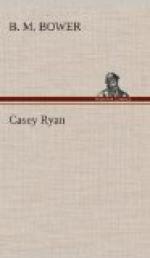Casey did, when the burros left him in peace long enough. They were misleading, pot-bellied animals that Casey hazed before him toward the Tippipahs. They never showed more than slits of eyes beneath their drooping lids, yet they never missed seeing whatever there was to see, and taking advantage of every absent-minded moment when Casey was thinking of the Injun Jim, perhaps. They were fast-walking burros when they were following a beaten trail and Casey was hard upon their heels, but when his attention wandered they showed a remarkable amount of energy in finding blind trails and following them into some impracticable wash where Casey wasted a good deal of time in extricating them. He said he never saw burros that hated so to turn around and go back into the road, and he never saw two burros get out of sight as quickly as they could when they thought he wasn’t watching. They would choose different directions and hide from him separately,—but once was enough for Casey. He lost them both for an hour in the sand pits twelve miles out of town, and after that he tied them nose to tail and himself held a rope attached to the hindmost, and so made fair time with them, after all.
The mule, Casey said, was just plain damn mule, sloughed off from the army, blase beyond words,—any words at Casey’s command, at least. A lopeared buckskin mule with a hanging lower lip and a chronic tail-switching, that shacked along hour after hour and saved Casey’s legs and, more particularly, a bunion that had developed in the past year.
Casey knew the country better than he had known it on his first unprofitable trip into the Tippipahs. He avoided Furnace Lake, keeping well around the Southern rim of it and making straight for Loco Canyon and the spring there while his water cans still had a pleasant slosh. There he rested his longears for a day, and disinterred certain tenderfoot luxuries which he had cached when he was there last time. And when he set out again he went straight on to the old stone hut where Injun Jim had camped. The tepee was gone, burned down according to Indian custom after a death, as he had expected. The herd of Indian ponies were nowhere in sight. Hahnaga’s brother, he guessed, had driven them off long ago.
Casey had worked out a theory, bit by bit, and with characteristic optimism he had full faith that it would prove a fact later on. He wanted to start his search from the point where Injun Jim had started, and he had rather a plausible reason for doing so.
Injun Jim was an Indian of the old school, and the old school did a great deal of its talking by signs. Casey had watched Jim with that pale, unwinking stare that misses nothing within range, and he had read the significance of Jim’s unconscious gestures while he talked. It had been purely subconscious; Casey had expected the exact location of the mine in words, and perhaps with a crudely accurate map of Jim’s making. But now he remembered Jim’s words, certain motions made by the skinny hands, and from them he laid his course.




